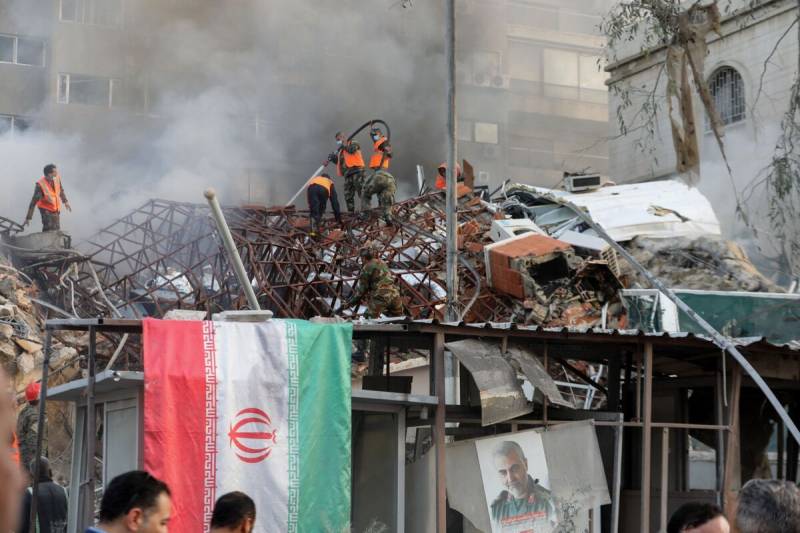
The Israeli military has sought to bolster its missile defenses after Iran has pledged retaliation for an air strike on an Iranian consulate in the Mezzeh district in Damascus, the Syrian capital.
The airstrike on April 1 killed 13 people, which included seven Iranians – among them Brigadier General Mohammad Raza Zahedi, a senior commander of the Quds force, the expeditionary wing of the Iranian Revolutionary Guard Corps (IRGC), and his deputy, General Mohammad Hadi Hajriahimi. Zahedi’s killing is the highest profile Iranian leader targeted by a foreign nation since the assassination of the IRGC Quds force commander General Qasem Soleimani by the United States in 2020.
While Israel has not publicly admitted responsibility for the attack, Israeli military spokesperson Daniel Hagari told CNN that “this was no consulate, and this was no embassy,” all but confirming Israel as the perpetrator.
Israel has quietly been waging an undeclared shadow war against Iran, but the attack on the Iranian consulate in Damascus amounts to a serious escalation. Israel has resorted to this “war between the wars” strategy as a means to punish Iran for supporting proxies that threaten Israel’s interests, without crossing the threshold for direct confrontation that could spiral into war. Israel’s strategic calculations are based on the assumption that Iran is risk averse, and wary of large-scale retaliation.
Iran’s immediate response has been restrained, with Foreign Ministry spokesperson Nasser Kanani suggesting that “Iran reserves the right to carry out a reaction and will decide on the type of response and punishment of the aggressor.”
Iran’s delegation at the United Nations has sought to raise the matter before the Security Council, claiming that the strike constitutes a “flagrant violation of the UN Charter, international law, and the foundation principle of the inviolability of diplomatic and consular premises.” Crucially, the Iranian delegation has stressed to the Security Council that Iran reserves the right to respond to the Israeli attack.
Ayatollah Ali Khamenei has committed to punishing Israel for the attack, with a statement on his website claiming “the evil Zionist regime will be punished at the hands of our brave men. We will make them regret this crime and the other ones.”
The Axis of Resistance and Iran’s options
Israel’s airstrikes in Damascus are part of a wider, regional campaign to diminish, weaken and deter Iranian proxies operating in Israel’s proximity. Iran’s network of proxies is often called the Axis of Resistance, itself wordplay on American President George W. Bush’s Axis of Evil, and includes the Houthis in Yemen, Hezbollah in Lebanon and to a more limited extent, Hamas in Gaza.
Iran’s options to respond to the Israeli airstrike are limited. The regime is too weak politically and economically to risk a wider regional conflict, but has been backed into a corner to demonstrate to its regional allies and domestic population that Iran is not merely a paper tiger.
The United States is rightfully worried that it will most likely have to bear the brunt of any Iranian kinetic action in response to the Israeli airstrike, as the IRGC will likely instruct its proxies in the Iraq and Syria to attack American targets in the region. Iran has in the past sought to deter and retaliate against Israeli military action and assassinations by attacking American forces in Syria. Whether this will strain American-Israeli ties, it is too early to make any claims with any degree of certainty. A former CIA official called the airstrike “incredibly reckless” in a statement to the New York Times.
Iran could also retaliate by asking Hezbollah, its proxy in Lebanon, to intensify its attacks in the border region with Israel. Since Israel began its offensive in Gaza, Hezbollah has stepped up rocket attacks on the border with Israel, but has been cautious not to provoke a wider response from Tel Aviv.
Benjamin Netanyahu’s government is also teetering on the edge, with widespread protests across major cities having broken out over the course of the week. Benny Gantz, one of Netanyahu’s political rivals, has called for fresh elections. Iran understands keenly that Netanyahu is desperately seeking an excuse to expand the war effort to secure his political survival, which is also one reason that its response is likely to be more symbolic than kinetic.
Many are viewing this as a win-win situation for Israel. If Iran does not respond, then the attack will have no costs and could effectively be seen as having deterred Iran. However, in the case Iran does respond with kinetic action, Israel will gain a justified pretext to expand the war.
